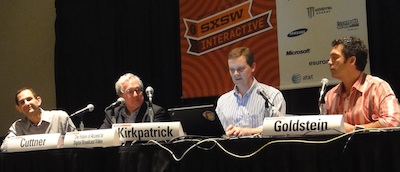SXSW Report: The Future of Online Video Captioning
People visit the South by Southwest Interactive conference for many reasons. Some want to promote the next great social media app, and some want to clue into that app before anyone else. Some come for the parties and swag, while others come to promote causes and concerns. Such was the case for "The Future of Access to Digital Broadcast Video," a first day panel that explained how the government is now mandating captions on much online video, and how publishers are rushing to meet the challenge.
As attendees learned, the government will soon require that online captions be available for broadcast material streamed online, and it mandates that those captions be equal in quality to TV captions. Surprisingly, though, it looks like they're going to be better.
The panel was led by Shane Feldman, chief operating officer for the National Association of the Deaf, who is deaf himself and whose words were voiced by an interpreter. Feldman told about the 21st Century Communications and Video Accessibility Act, which was passed in 2010. With 48 million people deaf or hard of hearing in the U.S., he said, up to 15 percent of a site's visitors could benefit from video captions. Captions have other uses, as well, such as helping search engines index videos, and making videos easier to enjoy in noisy surroundings, such as bars.
 Showing one possible future for video captions, Andrew Kirkpatrick, group product manager for accessibility for Adobe, demoed a solution created by his company. The Adobe model gave viewers much more control over captions than just turning them on or off: they could change the font, font size, position of the caption, and more. They could even shrink the video, so that a large caption doesn't overlay and obscure it.
Showing one possible future for video captions, Andrew Kirkpatrick, group product manager for accessibility for Adobe, demoed a solution created by his company. The Adobe model gave viewers much more control over captions than just turning them on or off: they could change the font, font size, position of the caption, and more. They could even shrink the video, so that a large caption doesn't overlay and obscure it.
Glenn Goldstein, vice president of media technology strategy for Viacom/MTV Networks, explained some of the workflow challenges for creating online captions. While it sounds simple to keep broadcast captions with a video file when it moves to online, Goldstein explained that there are typically two video workflows for large publishers, one for broadcast and one for online. Since creating duplicate captions for every piece of content would be cost and time prohibitive, organizations like MTV need to move to a single workflow system. That, however, introduces challenges, such as what to do when a piece of music is cleared for broadcast use, but not for online streaming.
How exactly online captions should be handled is still up in the air, Goldstein explained. On Apple devices, users are able to turn captions on and off in the settings. Goldstein favors this approach to having every publisher build their own software controls, since it offers more standardization. Feldman noted that he'd like the ability to turn online video captions on and leave them on, no matter the site or the session. That's how it works with televisions, he explained.
Another challenge for broadcasters is what to do about the large libraries of uncaptioned material already available online. It's "a giant do-over," noted Craig Cuttner, senior vice president for advanced technology at HBO. Captioning hundreds or thousands of hours of older material will require automated and highly accurate solutions.
"It's a challenge that we all need to find a way to work around," said Kirkpatrick.
Related Articles
Government regulations spell out exactly what online video needs to be captioned. Learn the laws to avoid fines and lawsuits.
06 Sep 2013
System can extract caption data, then synchronize it with multiformat online video streams.
11 Apr 2012
While most applaud the requirements for video captioning, some question the cost.
29 Oct 2010
YouTube introduced automatic video captioning last week, and an industry expert says that it's one of the few companies with the resources to do it right
07 Mar 2010
A bill proposed by Massachusetts representative Edward Markey would extend the FCC's captioning rules to internet video but would exempt user-generated and online-only content.
Mon., July 13, by Troy Dreier
13 Jul 2009